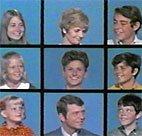I saw this story on NPR. It reminded me of my dog. At home when there is only on ball and I throw him the tennis ball he brings it back. If there is more than one ball he does not bring the ball back. He seems to get confused as to which ball he is to bring back.
I have noticed that the link is not working so I am copying and pasting the story below:November 19, 2005 · Medicare recipients can now sign up to get prescription drug insurance through Medicare. It's the biggest change since the government program started 40 years ago. Even government officials admit signing up for the program will take some effort.
At a flu vaccine clinic in Washington, D.C., Jean Meisel is like many other Medicare recipients. She's thinking about what to do about the new prescription program. She'd like to sign up before it begins Jan. 1. But she doesn't know what plan to pick. She's not computer savvy.
But she agrees to give it a try, so we log on together, and go to www.medicare.gov. She's particularly interested in finding a plan from the American Association of Retired Persons (AARP). After a brief delay, more than three dozen plans appear on the screen, AARP among them.
But the type is too small for Meisel to read easily. Together, we finally find AARP, and we can see that she could join an AARP plan, if she's willing to purchase her drugs at a large chain pharmacy instead of the neighborhood pharmacy, where she's been going for years and knows the pharmacist.
Across the room, 80-year-old Thelma Robinson and her 61-year-old son Charles Hall have just gotten their flu shots. Hall gets his mother her prescription drugs. She takes about six or seven pills a day. Hall, who pays for his mother's medication, spends about $100 a month on them.
Hall is computer savvy, but dealing with Social Security via computer has scared him off. His mother got a form in the mail from the government to apply for financial assistance. He mailed it back this week and they're waiting to hear before they sign up.
In Florida, 65-year-old Ed Rubiera wrote a letter to the Orlando Sentinel saying as someone in Mensa, and with an MBA, he figured he could work things out himself. But he had a hard time on the Internet site. He says it doesn't go deep enough. He had to go to individual company Web sites and make phone calls. He's not happy about the 64 choices he has. He says it's too complex. He is, though, happy about one thing. He figures he'll save about $700 nex year. So he's already signed up.
Some people have had very good experiences. Patricia Longenecker of Elizabethtown, Pa. attended a seminar put on by a consortium of state, federal and private groups. A state official worked the computer for her, and Longenecker feels like she understands her options. Longenecker's mother is only on a few drugs now. The cost of premiums for the new program and meeting the deductible would be more than what she's paying now. Nevertheless, Longenecker says, she's looking toward the future when her mother may need more drugs, and she's planning to sign her mother up for one of the plans.
The government doesn't have any sign-up figures yet. Benefits and charges for those who sign-up before the end of the year begin Jan. 1.








